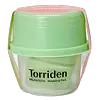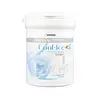What's inside
What's inside
 Key Ingredients
Key Ingredients

 Benefits
Benefits

 Concerns
Concerns

 Ingredients Side-by-side
Ingredients Side-by-side

Diatomaceous Earth
AbrasiveGlucose
HumectantAlgin
MaskingCI 77231
Cosmetic ColorantKaolin
AbrasiveTrehalose
HumectantBetaine
HumectantChlorella Vulgaris Powder
Skin ConditioningXylitol
HumectantCentella Asiatica Extract
CleansingMelaleuca Alternifolia Leaf Extract
PerfumingPanthenol
Skin ConditioningAllantoin
Skin ConditioningMadecassoside
AntioxidantAsiaticoside
AntioxidantAsiatic Acid
Skin ConditioningMadecassic Acid
Skin ConditioningDextrin
AbsorbentSodium Dehydroacetate
PreservativeTetrasodium Pyrophosphate
BufferingCarthamus Tinctorius Flower Extract
Skin ConditioningGardenia Florida Fruit Extract
Skin ConditioningSodium Hyaluronate
HumectantWater
Skin ConditioningGlycerin
HumectantButylene Glycol
Humectant1,2-Hexanediol
Skin ConditioningLactobacillus Ferment
Skin ConditioningAlthaea Rosea Flower Extract
Skin ConditioningNymphaea Caerulea Flower Extract
Skin ConditioningSwertia Japonica Extract
Skin ConditioningDiatomaceous Earth, Glucose, Algin, CI 77231, Kaolin, Trehalose, Betaine, Chlorella Vulgaris Powder, Xylitol, Centella Asiatica Extract, Melaleuca Alternifolia Leaf Extract, Panthenol, Allantoin, Madecassoside, Asiaticoside, Asiatic Acid, Madecassic Acid, Dextrin, Sodium Dehydroacetate, Tetrasodium Pyrophosphate, Carthamus Tinctorius Flower Extract, Gardenia Florida Fruit Extract, Sodium Hyaluronate, Water, Glycerin, Butylene Glycol, 1,2-Hexanediol, Lactobacillus Ferment, Althaea Rosea Flower Extract, Nymphaea Caerulea Flower Extract, Swertia Japonica Extract
Ingredients Explained
These ingredients are found in both products.
Ingredients higher up in an ingredient list are typically present in a larger amount.
Algin is brown algae. Algae is an informal term for a group of aquatic organisms that can photosynthesize. It is estimated there are at least 30,000 types of Algae.
Algae contains antioxidants. Antioxidants help fight free-radicals. Free-radicals are molecules that may damage your skin cells, such as pollution.
Allantoin is a soothing ingredient known for its protective and moisturizingg properties. Because of this, it is often added to products with strong active ingredients.
Studies show higher concentrations of this ingredient can promote wound healing.
Though it can be derived from the comfrey plant, allantoin is produced synthetically for cosmetic products to ensure purity.
Learn more about AllantoinWe don't have a description for CI 77231 yet.
Diatomaceous Earth is an exfoliant.
Glucose is a simple sugar and is the most important source of energy in all organisms.
In skincare, glucose is used to hydrate the skin. It also acts as a prebiotic for our natural biome.
Glucose is hydrating due to its humectant property. As a humectant, glucose draws moisture from the air and from deeper levels in the skin.
Our skin contains many sugars that act as prebiotics and help strengthen our natural microbiome. Having a healthy microbiome helps protect our skin from harmful bacteria and other contaminants.
Studies show glucose may help with fading discoloration and pigmentation. This is because our skin metabolizes glucose into lactic acid. Lactic acid is an AHA that helps exfoliate the top layer of skin.
Learn more about GlucoseSodium Hyaluronate is hyaluronic acid's salt form. It is commonly derived from the sodium salt of hyaluronic acid.
Like hyaluronic acid, it is great at holding water and acts as a humectant. This makes it a great skin hydrating ingredient.
Sodium Hyaluronate is naturally occurring in our bodies and is mostly found in eye fluid and joints.
These are some other common types of Hyaluronic Acid:
Learn more about Sodium HyaluronateWe don't have a description for Tetrasodium Pyrophosphate yet.